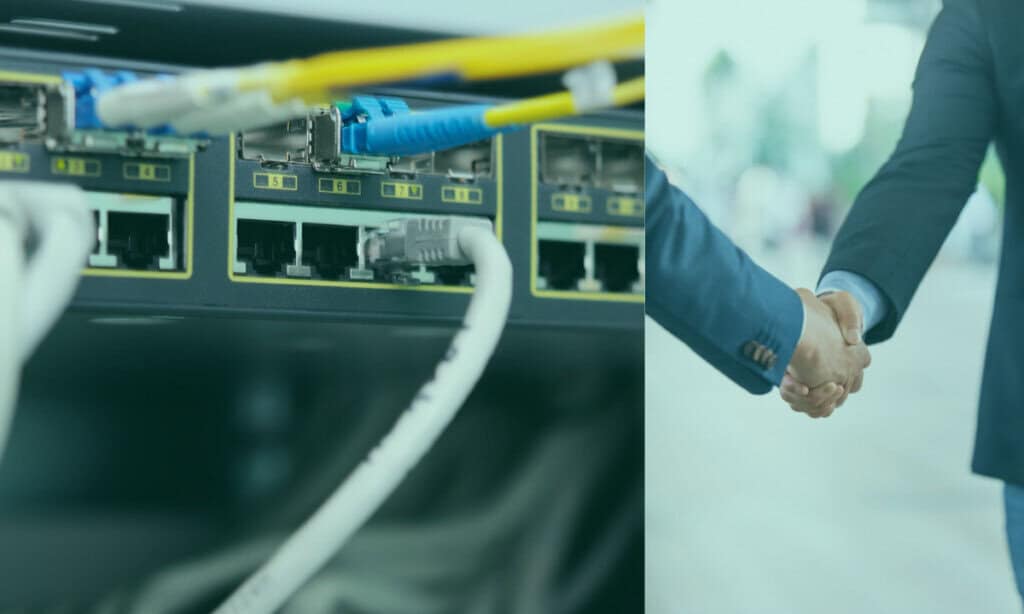Last Updated on December 30, 2025 by Ewen Finser
For digital-first organizations, including SaaS providers, e-commerce businesses, agencies, and managed service providers, network performance is critical. Yet, enterprise-grade networking equipment such as switches, routers, firewalls, and transceivers carries significant upfront costs, and OEM lead times can stretch weeks or months.
Purchasing used or refurbished networking equipment has become a practical alternative. It enables rapid deployment of enterprise-grade gear, offers substantial cost savings, and supports environmental sustainability initiatives. Refurbished networking hardware now often undergoes engineering-led testing, warranty-backed certification, and pre-configuration services, making it a reliable choice for production environments, spare pools, and labs alike.
TL;DR
Purchasing refurbished networking equipment is a cost-effective, reliable, and sustainable solution for digital-first businesses, including e-commerce companies, SaaS providers, and agencies. Organizations can save 40–80% compared to new OEM hardware while maintaining enterprise-grade performance. Key benefits include:
- Cost savings: Reduce upfront expenses and support redundant spare pools.
- Reliability: Engineering-led testing, serialized QA, and warranties ensure dependable performance.
- Sustainability: Extend equipment lifecycles, reduce e-waste, and support ESG initiatives.
- Operational efficiency: Standardized pre-configured hardware, lifecycle management, and spare pools reduce downtime and simplify deployments.
My top vendor option for buying used networking equipment is Alta Technologies for their 30+ years of experience, engineering-led refurbishment, global inventory, and pre-staging services. Other strong options include ServerMonkey, New Server Life, and xByte, each offering certified, tested, and reliable networking gear suitable for various enterprise and SMB needs.
Vendor | Key Strengths | Certifications / QA | Inventory Highlights | Best For | Warranty Support |
Alta Technologies | Engineering-led testing, pre-configured VLANs, lifecycle management | ISO 9001, R2, serialized QA | Switches, routers, transceivers, line cards, rails, power supplies | Multi-branch enterprises, MSPs, data centers | 90 days–1 year; optional advanced replacement; support for pre-staging |
ServerMonkey | Budget-friendly, ISO-certified refurbishment, QA reports | ISO 9001 | Switches, routers, firewalls, transceivers | SMBs, startups, cost-conscious enterprises | 90-day warranty; RMA and cross-ship options |
New Server Life | Fast fulfillment, large inventory, optional pre-staging | Internal QA protocols | Switches, routers, optics | Multi-site enterprise rollouts, urgent deployments | Standard warranty; pre-staging and configuration optional |
xByte Technologies | Engineering-driven QA, legacy hardware support, pre-staging | ISO 9001, internal QA | Switches, routers, accessories, legacy components | Mid-market and enterprise buyers needing stringent QA | Warranty varies; documentation included |
Stallard Technologies (STI) | Warranty-backed, service-oriented, pre-configuration | Internal QA, ISO-certified practices | Switches, routers, firewalls | Enterprises needing production-ready, guaranteed equipment | Advanced replacement, firmware staging, detailed deployment documentation |
Why Buy Refurbished Networking Equipment?
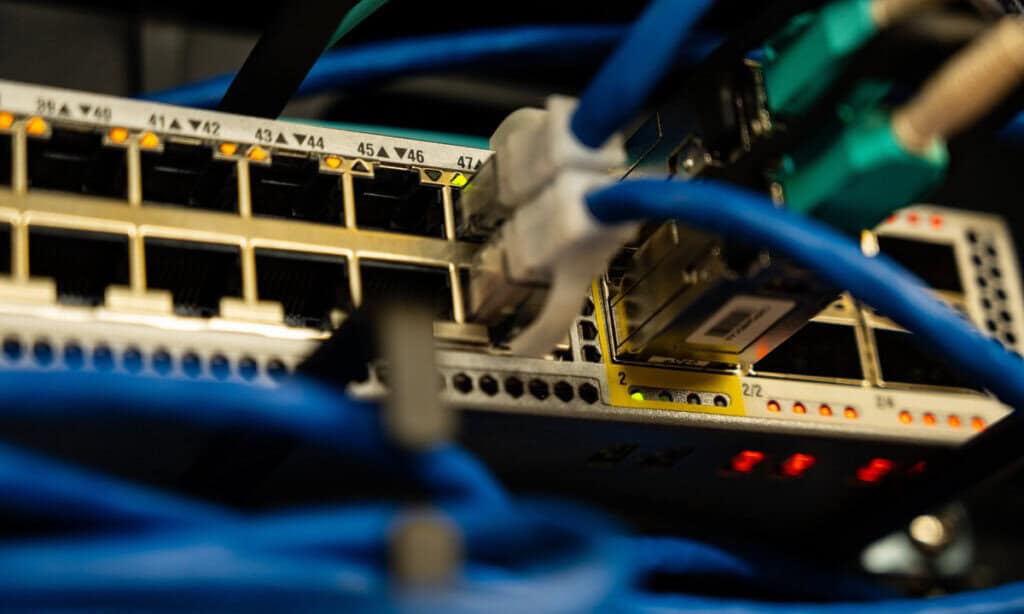
Cost Savings
The most immediate advantage of buying refurbished networking equipment is cost reduction. Organizations often acquire enterprise-grade switches, routers, and firewalls for 40–80% less than OEM pricing, enabling IT teams to stretch their budgets further. These savings make it feasible to:
- Build redundant spare pools for rapid replacement.
- Upgrade network infrastructure without exceeding CapEx limits.
- Invest in network monitoring, security tools, or hybrid cloud integrations.
Networking equipment typically depreciates sharply in the first few years, but mature hardware retains operational reliability while delivering substantial cost benefits. This combination of performance and affordability makes refurbished networking equipment appealing to both SMBs and large enterprises.
Reliability
Many buyers assume used hardware is risky, but reputable vendors follow rigorous refurbishment protocols to ensure reliability:
- Visual inspection of chassis, ports, and connectors.
- Port-by-port functional verification to ensure all network interfaces work.
- PoE (Power over Ethernet) load testing to validate power delivery.
- Thermal profiling under sustained operational load.
- Extended burn-in testing to catch early failures.
Firmware is updated or staged to match customer specifications. Serialized quality assurance (QA) documentation accompanies each unit, ensuring transparency. Many vendors also offer 90-day to multi-year warranties with advance replacement, allowing refurbished devices to be deployed confidently in production networks.
Sustainability
Refurbished networking equipment directly supports ESG initiatives:
- Extends hardware lifecycle, reducing electronic waste.
- Lowers environmental footprint by minimizing the need for new manufacturing.
- Ensures responsible disposal of traded-in or end-of-life devices.
Organizations can align IT procurement with corporate sustainability goals while mitigating supply chain risks, particularly during semiconductor shortages or shipping delays.
Operational Advantages
Beyond cost, reliability, and sustainability, refurbished equipment delivers tangible operational benefits:
- Extended functional lifespan of devices by 3–5 years beyond OEM depreciation.
- Faster deployment across multiple sites, reducing installation errors.
- Predictable performance for both production and lab environments.
- Lower total cost of ownership due to reduced need for immediate capital expenditure.
Case studies demonstrate SMBs realizing up to 70% cost savings compared to new equipment while maintaining enterprise-grade reliability. Enterprises with multiple sites report reduced downtime and simplified spare management by standardizing on pre-tested refurbished hardware.
Key Considerations When Choosing a Vendor
Selecting the right vendor is critical for maximizing ROI, ensuring reliability, and supporting operational objectives.
Certifications and Technical Expertise
Vendors should demonstrate professional certifications, including:
- ISO 9001: Standardized quality management.
- R2/R2v3: Responsible electronics recycling and IT asset disposition.
- ITAD certifications: Ensuring secure handling of sensitive or regulated data.
Technical staff should hold credentials such as CCNA, CCNP, CCIE, or JNCIA, ensuring engineers can manage complex enterprise-grade equipment. Vendors with cybersecurity, logistics, and ITAD experience are better equipped to manage sensitive hardware safely and efficiently.
Depth and Rigor of Testing
High-quality vendors provide detailed QA documentation, describing their inspection and refurbishment process. Core testing steps should include:
- Visual and functional inspections.
- Port-by-port verification.
- PoE load testing.
- Thermal stress profiling.
- Firmware verification and burn-in testing.
Serialized QA reports provide traceability and allow buyers to validate the reliability of each unit. Vendors who offer pre-staged configurations or VLAN baseline setup reduce deployment errors and accelerate rollouts.
Warranty Coverage and RMA Policies
Robust warranty and return policies are critical:
- Coverage for parts, labor, and shipping.
- Procedures for dead-on-arrival units and early failures.
- Cross-ship or advance replacement options.
- Firmware and software support.
A comprehensive warranty ensures confidence when integrating refurbished devices into production networks.
Inventory Depth
Vendors with large and diverse inventories provide:
- Multiple units of the same model.
- Compatible accessories, transceivers, rails, and power supplies.
- Legacy or rare components for phased upgrades.
A broad inventory allows enterprises to standardize deployments, maintain spare pools, and respond quickly to network expansion needs.
Engineering and Pre-Deployment Support
Engineering services can save time and reduce errors:
- VLAN baseline setup and stack ID assignment.
- Firmware staging and pre-configuration.
- Consulting for network design, capacity planning, and integration.
Pre-deployment support is particularly valuable for organizations managing multi-branch networks, MSPs, or hybrid cloud environments.
My Picks for the Best Places to Buy Used Networking Equipment
Several vendors stand out for their reliability, services, and inventory depth.
Alta Technologies: Engineering-Led Expertise
Alta Technologies is my top pick and the first place I look for refurbished equipment. The company exemplifies engineering-led testing. Every unit undergoes:
- Port-level validation.
- PoE load and thermal profiling.
- Burn-in under realistic operational conditions.
- Firmware verification and staged configuration as needed.
Alta maintains one of the largest inventories, covering switches, routers, line cards, transceivers, rails, and accessories from Cisco, Juniper, HPE, Arista, and more. Pre-deployment services include VLAN baselines, stack IDs, and optional firmware staging. Serialized QA documentation and lifecycle programs, including secure trade-ins, buybacks, and trade-up credits, enable organizations to standardize deployments, optimize costs, and simplify refresh cycles.
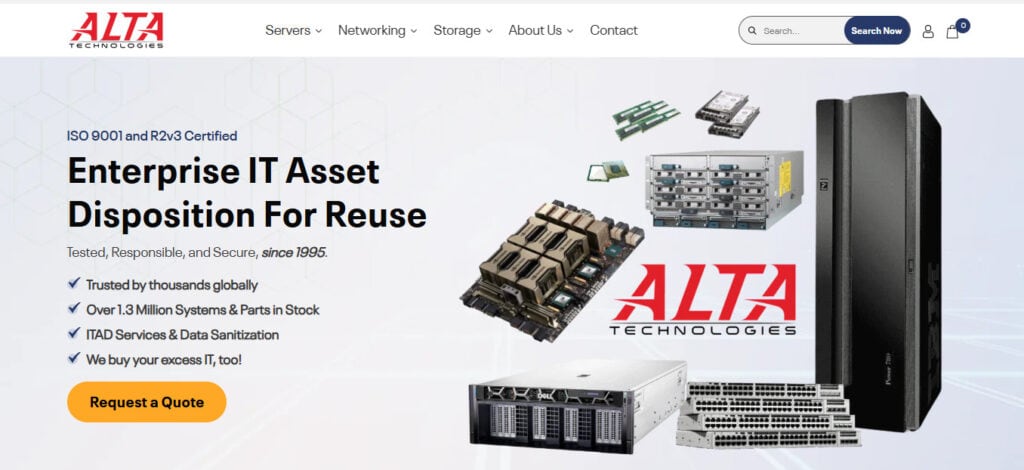
ServerMonkey: Affordable, Certified Options
ServerMonkey offers ISO-certified refurbishment with strict testing protocols, QA reports, and pre-configuration services. The vendor provides broad inventory for SMBs, startups, and cost-conscious enterprises, allowing standardized deployment without sacrificing reliability. I think that ServerMonkey is well-suited for organizations seeking a balance of quality and cost.
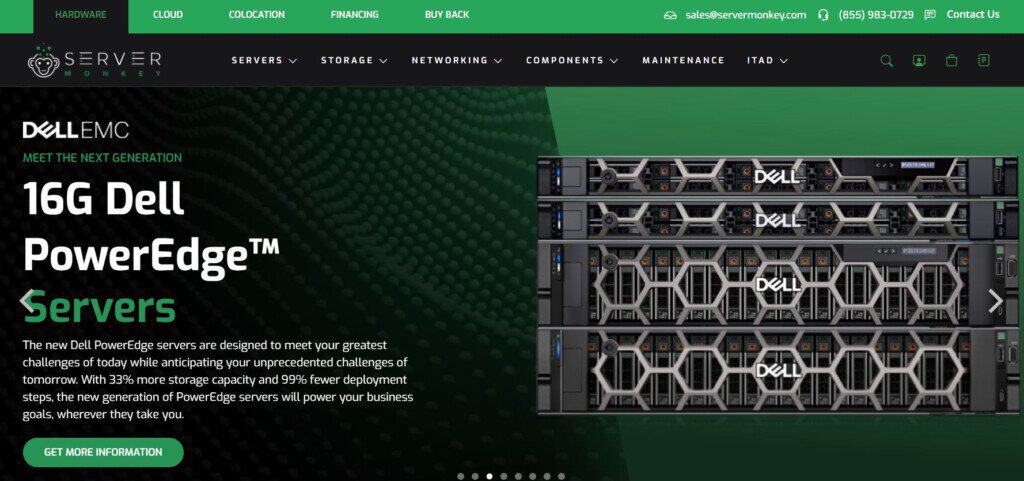
New Server Life: Fast Fulfillment
New Server Life emphasizes rapid order processing and inventory depth. Units undergo functional testing, PoE verification, thermal stress testing, and firmware staging. Optional configuration services, including VLAN baselines and stacking support, help IT teams deploy consistent hardware quickly. I think that this vendor is best for organizations with urgent, multi-site rollout requirements.
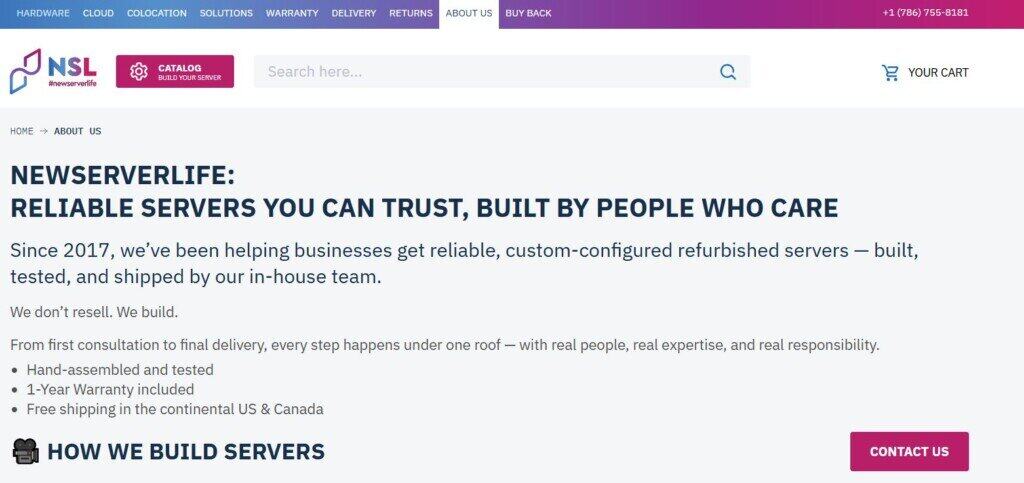
xByte Technologies: Enterprise & Legacy Focus
xByte Technologies focuses on complex deployments, multi-location consistency, and legacy hardware support. Each unit undergoes engineering-led testing, QA documentation, and pre-staging. xByte is ideal for mid-market and enterprise buyers seeking high reliability, legacy compatibility, and strict quality assurance.
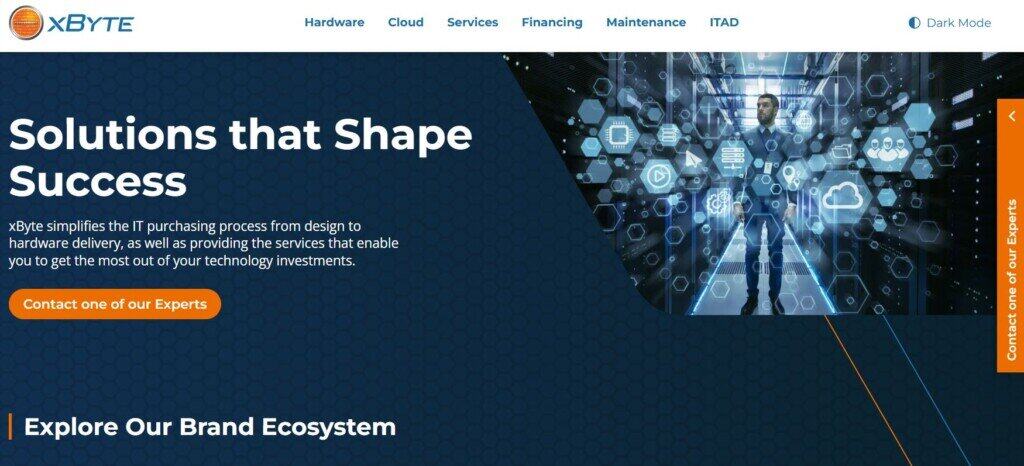
Leadership Considerations
Strategic Benefits
For digital business leaders, choosing refurbished networking equipment can be more than a cost-saving tactic—it can support strategic initiatives:
- Cost Recovery and ROI: Reduced expenditure on network infrastructure allows reallocation of funds to development, marketing, or other growth areas.
- Operational Continuity: Standardized spare pools and pre-staged configurations reduce downtime, ensuring critical business operations remain uninterrupted.
- Sustainability and ESG: Leaders can demonstrate corporate responsibility by reducing e-waste and supporting circular economy initiatives.
Risk Management
Purchasing refurbished networking equipment involves careful risk evaluation:
- Ensure vendors follow strict testing and certification protocols.
- Verify warranty coverage, RMA processes, and pre-deployment support.
- Maintain detailed inventory tracking and serialized QA documentation.
By proactively managing these factors, executives mitigate operational risk, preserve client trust, and ensure network resilience.
Final Thoughts
If you’re looking for the best places to buy used networking equipment, the good news is you don’t have to choose between saving money, getting reliable gear, and staying sustainable. You can have all three. Refurbished hardware offers 40–80% savings compared to new OEM, while still delivering enterprise-grade performance thanks to rigorous testing and warranty-backed certification. Plus, extending hardware lifecycles directly supports ESG and e-waste reduction goals.
Among vendors, Alta Technologies stands out for its engineering-led approach, massive inventory, and pre-deployment services. ServerMonkey, New Server Life, and xByte Technologies are also strong picks depending on your budget, timeline, and technical requirements.
The bottom line: by choosing the right partner and taking advantage of pre-staging, standardization, and lifecycle management, digital-first organizations can build cost-effective, reliable, and future-proof networks without the long lead times (or the price tags) of brand-new OEM hardware.

